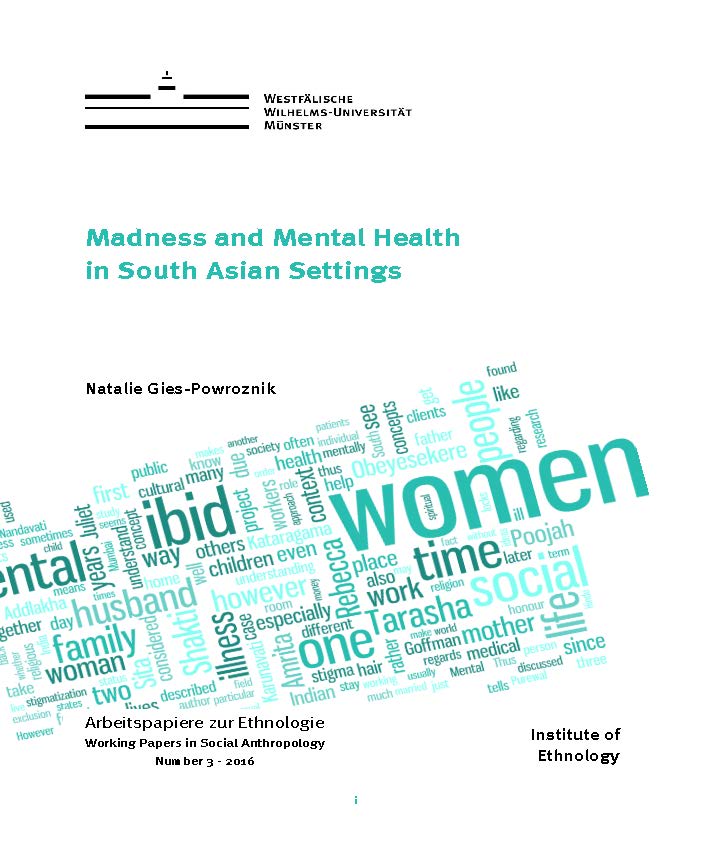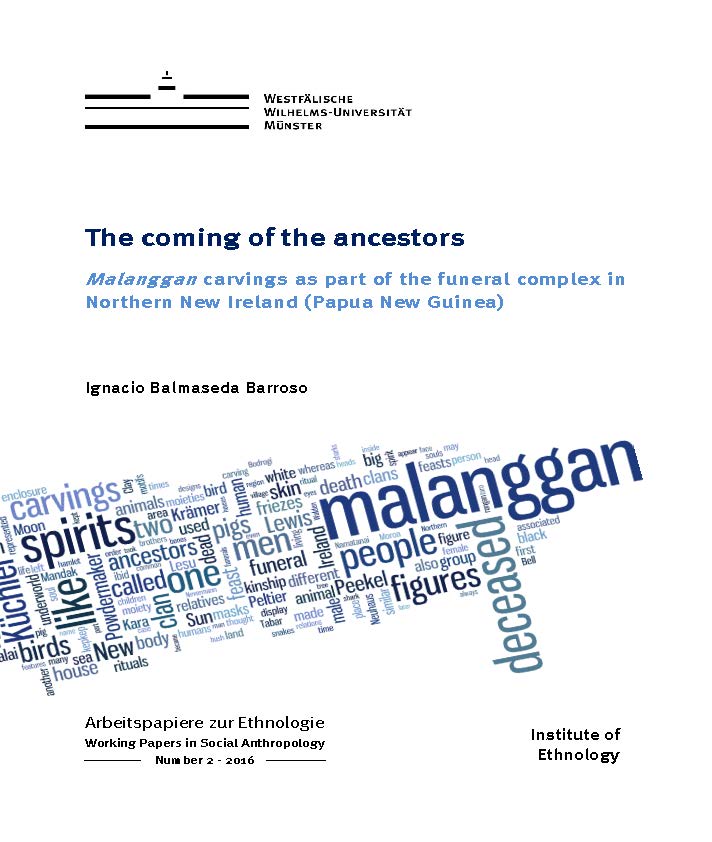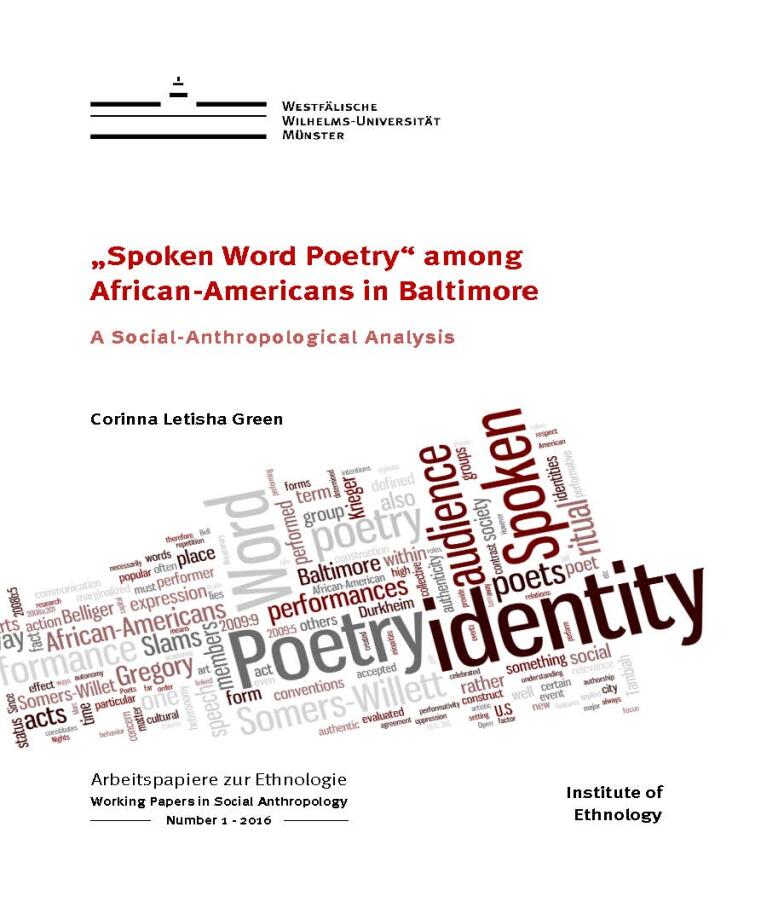Arbeitspapiere zur Ethnologie - Working Papers in Social Anthropology
In dieser Reihe macht das Institut für Ethnologie Münster besonders gelungene Master-Abschlussarbeiten öffentlich zugänglich.
Indonesian Migrants in Taiwan - Religion and Life-styles (2015)
Petra Melchert
The analysis of the working conditions of the Indonesian foreign workers in Taiwan as well as their social activities represents the starting point of the present thesis. Its framework is completed by one other group of Indonesians; those that started studying at various Taiwanese universities in recent years. Even though the majority of Indonesian students are of the same age as the Indonesian workers and also originate from Java, both groups differ from each other significantly in terms of education, religious thinking and lifestyle. This duality of Indonesian community in Taiwan as well as their relationship to each other constitutes the focus of this paper.

© Institut für Ethnologie Madness and Mental Health in South Asian Settings (2016)
Natalie Gies-Powroznik
This study presents a comparison of two diverse concepts to frame deviant behaviour – Madness and Mental Health – that for the regional contexts of India and Sri Lanka cannot only be distinguished by their defining roots of biomedicine and traditional therapeutic approaches, but furthermore by how women living with a mental affliction in one setting or the other are solving their conflicts within the same.
It thus will be discussed in this study how ‘culture’ enters into ‘psychiatry’ and how exactly the culture and its female actors manage deviance, suffering and healing. In the first part of the study Transcultural Psychiatry will be located within the discipline and the branch of Medical Anthropology. Furthermore, the research conditions and field definitions for the first part of the study are introduced, and the theoretical framework and methods that have been applied are presented together with ethical considerations.
In the second chapter, the focus will be on the women that are diagnosed with a mental illness and spend their lives in vocational trainings as clients of an NGO project based in Mumbai. The chapter is introduced by historically contextualizing the psychiatric institutions in India, Mental Health as a category, and discussing aetiological matters. Subsequently, five women‘s case files are being presented and discussed with regards to the concepts of stigma and exclusion.
In the third part, the concept of Madness is introduced for the cultural context of South Asia before presenting Gananath Obeyesekere‘s research on possessed women in Sri Lanka. After presenting three crucial cases from Medusa‘s Hair, it will be debated how the women solve their conflicts and whether concepts of stigmatization and exclusion apply to them.
Finally, a synoptic view will be offered by comparing the two settings and concepts with regards to the female agents‘ narratives of how they make sense of their lives concerning their mental conditions as well as general conflicts.

© Institut für Ethnologie The coming of the ancestors (2016)
Ignacio Balmaseda Barroso
The purpose of this work is to research the local funeral beliefs behind the malanggan carvings of Northern New Ireland (New Guinea), produced for funeral feasts to honor deceased relatives. Malanggan are wooden figures and friezes representing human and animals, and disks made out of fiber, exhibited in those feasts and later abandoned or destroyed. Phrased as a research question, this paper´s inquiry is: what is the relation of the carvings and the rituals in which they were used, to the local ideas about death, the after-life, the spirits, and the characters that appear in tales? My hypothesis is that the meaning and context of carvings in rituals can be understood in terms of those local ideas, especially as we find them in the early accounts when the impact of Western culture was still small. For that, we need to understand the rituals and the social relations in which they were embedded as well.

© Institut für Ethnologie "Spoken Word Poetry" among African-Americans in Baltimore (2016)
Corinna Letisha Green
When one encounters the term Spoken Word in a record shop, for example, it can indicate a plethora of materials, such as audio recordings of speeches, comedy routines or even sermons (Gregory, 2008a:201). However, when the term is applied in poetry settings, it refers to the performance of prose, poetry or stories and stands in contrast to the Written Word (Ibid). This interpretation of Spoken Word has established itself in the U.S.A. and nowadays the term is commonly associated with performance poetry. In fact, Spoken Word Poetry has grown to be a very popular form of performing arts in the U.S., both as a means of expression for artists as well as for the enjoyment of the spectator. Poets perform their pieces - combinations of literary and oratory aesthetics (Dill, 2013:1) - on popular television shows, receive thousands of views on their internet videos, or gain recognition by competing in Poetry Slams or by taking the stage at Open Mic Nights. It is said that Marc Smith, a Chicago based construction worker turend poet, founded Poetry Slams, Spoken Word Poetry competitions, in the 1980s (Somers-Willett, 2009:5). Hintentions were...

© Institut für Ethnologie

